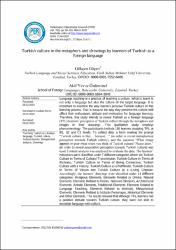Turkish Culture in the Metaphors and Drawings by Learners of Turkish as a Foreign Language
Künye
GÖÇEN, Gökçen & Akif Yavuz ÖZDEMİREL. "Turkish Culture in the Metaphors and Drawings by Learners of Turkish as a Foreign Language". Participatory Educational Research (PER), 7.1 (2020): 80-110.Özet
Language teaching is a practice of teaching a culture. What is learnt is not only a language but also the culture of the target language. It is important to examine the way learners perceive Turkish culture in this learning process. That is because the way they perceive the culture will affect their enthusiasm, attitude and motivation for language learning. Therefore, this study intends to reveal Turkish as a foreign language (TFL) learners’ perception of Turkish culture through the metaphors and images in their drawings. This qualitative study employs phenomenology. The participants include 180 learners studying TFL at B1, B2 and C1 levels. To collect data, a form reading the prompt “Turkish culture is like… because…” (in order to reveal metaphorical perception towards Turkish culture), and the question “What image appears in your mind when you think of Turkish culture? Please draw.” (in order to reveal associative perception towards Turkish culture) was used. Content analysis was employed to evaluate the data. The learners’ metaphors were classified under 7 different categories which are Turkish Culture in Terms of Cultural Transmission, Turkish Culture in Terms of Richness, Turkish Culture in Terms of Being Connective, Turkish Culture with a History, Turkish Culture as a Pathfinder, Turkish Culture in Terms of Values and Turkish Culture as a Living Creature. Accordingly, the learners’ drawings were classified under 14 different categories: Religious Elements, Elements Related to Drinks, Natural Elements, Elements Related to Dishes, National Elements, Architectural Elements, Artistic Elements, Traditional Elements, Elements Related to Language Teaching, Elements Related to Animals, Metaphorical Elements, Elements Related to Notable Personages, Historical Elements and Other Elements. The results showed that although TFL learners had a positive attitude towards Turkish culture, they were not able to associate language with culture.
Kaynak
Participatory Educational Research (PER)Cilt
7Sayı
1Bağlantı
http://www.perjournal.com/archieve/issue_7_1/Per_2020_6_pdf.pdfhttps://dergipark.org.tr/tr/download/article-file/964906
https://hdl.handle.net/11352/3482



















